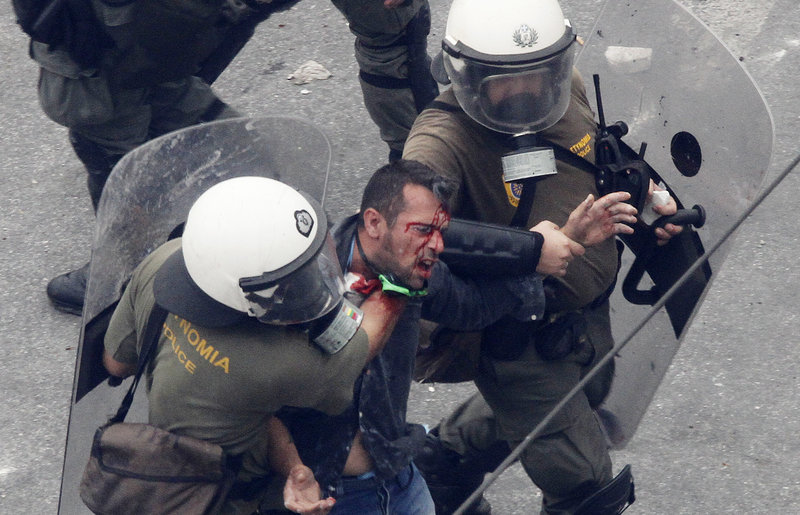ATHENS – Greece took a step back from imminent default Wednesday by passing a stinging new austerity package but failed to dispel fears that its mounting debt is becoming unsustainable and, sooner rather than later, will still have to be restructured.
The Greek government eked out a tense legislative victory that saw lawmakers defy raging street protests outside parliament to vote 155-138 in favor of $40 billion in painful budget cuts and tax increases over the next few years.
The showdown came after stark warnings from European leaders that failure to pass the austerity plan would spell certain bankruptcy for Greece and potential disaster for the euro by spreading instability to more populous debt-laden nations such as Spain and Italy. That turmoil might shake markets in the U.S. and other major economies far from Athens.
Lawmakers in Athens are now set to vote on a follow-up measure today detailing how the austerity package is to be implemented.
Wednesday’s decision lifted the government’s hopes that the second bill would also get the necessary majority.
Approval of both measures is necessary for Greece to receive the next installment of funds from the bailout put together last year by the European Union and the International Monetary Fund. Without the fresh infusion of cash, Athens would be unable to pay bills that come due in mid-July and would have no choice but to go into default.
The austerity package — the harshest here in recent memory — also paves the way for a second rescue package for Greece on top of last year’s $158 billion bailout. With its economy shrinking, its public coffers depleted and its bond ratings in the basement, Greece is effectively shut out from raising money in the private market and needs another lifeline from its European neighbors and the IMF to stay afloat.
“The choice is simple: Either we press ahead with the road of change, a road that is difficult, or we choose catastrophe,” Prime Minister George Papandreou told lawmakers before Wednesday’s roll-call vote. “We choose the first.”
But analysts have become increasingly gloomy over Greece’s prospects for economic growth and its ability to pay off a debt that far exceeds the country’s entire annual economic output.
Many experts now describe Athens as caught in a vicious cycle from which it cannot escape, as public consumption and tax revenues shrink while loans pile up and the debt burden grows. A previous round of drastic austerity cuts has failed to put Greece back on track as hoped, but the EU and IMF have demanded more of the same, which some say is an attempt to wring blood from a stone.
Wednesday was the second day of a 48-hour nationwide strike that brought much of Greece to a halt.
As happened Tuesday, violence marred the rally in Athens when self-styled anarchists overturned umbrellas and chairs from sidewalk cafes to form barricades and hurled rocks at riot police, who used stun grenades and tear gas to disperse the crowds.
Copy the Story Link
Send questions/comments to the editors.



Success. Please wait for the page to reload. If the page does not reload within 5 seconds, please refresh the page.
Enter your email and password to access comments.
Hi, to comment on stories you must . This profile is in addition to your subscription and website login.
Already have a commenting profile? .
Invalid username/password.
Please check your email to confirm and complete your registration.
Only subscribers are eligible to post comments. Please subscribe or login first for digital access. Here’s why.
Use the form below to reset your password. When you've submitted your account email, we will send an email with a reset code.